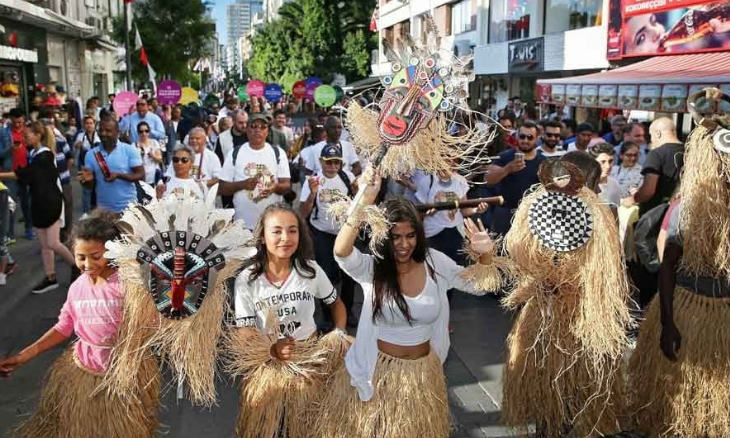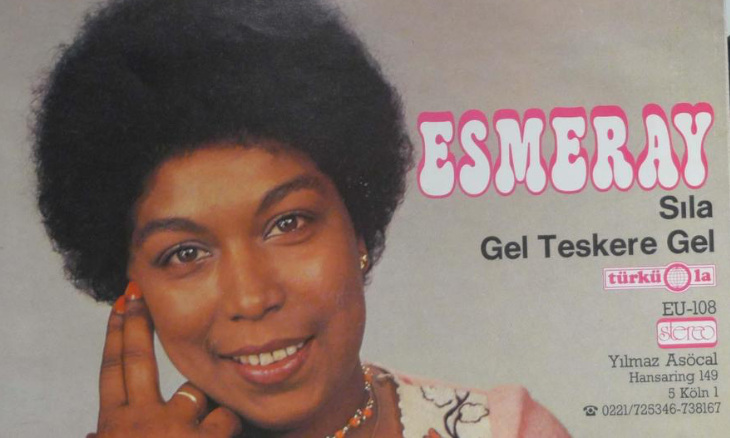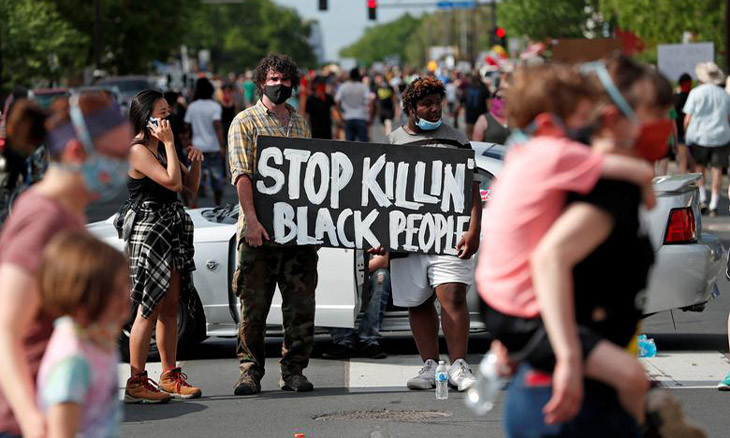Turkey’s Afro-Turks speak up on George Floyd affair
Nazlan Ertan writes: Though they are citizens, Afro-Turks mostly remain among their own. In a country marked by its minorities’ turbulent history and unhealed wounds, the Afro-Turks are little known, mainly because they speak infrequently, hardly ever mingle outside the Aegean region, and little research has been carried out on them.
Nazlan Ertan / IZMIR
On one of the first warm days on the Aegean coast of Turkey, the region’s minuscule black community, joined by their relatives across the country and beyond, don straw skirts and African masks and dance to the sound of drums with dancers dressed as calves. An old tradition that was revitalized in 2007, the Calf Festival is the event through which the Afro-African community in the region exerts its presence and showcases its identity and culture. This year’s festival, scheduled to take place in mid-June, was postponed due to the COVID-19 outbreak in Turkey.
Instead, the Afro-Turks (Turks of African descent) went on camera to make several statements condemning the death of African American George Floyd, racism and police brutality. This is a rare occurrence, as the community rarely makes political statements or engages in politics. In the 2018 elections, two Afro-Turk men from Izmir ran for seats in parliament for the first time: one from the pro-Kurdish People’s Democracy Party (HDP) and another from center-right Good Party (Iyi Party).
Last week's statements from the Afro-Turk community condemned racism and racial discrimination around the world, particularly in the United States. Both statements also praised Turkey’s treatment of its black community.
“We condemned racism and discrimination against the black people around the world,” Şakir Doğuluer said to Duvar English about their statement. Doğuluer is the president of the Izmir-based African Culture, Solidarity and Assistance Association – better known as the Afro-Turk Association. Another statement came from Mesut Mercan, the head of the African Turks Development and Solidarity Association (AFTÜDER), who called his black brethren to restraint and to Islam. Mercan, who unsuccessfully bid for an MP seat for the İyi Party in the 2018 elections, echoed that Turkey rejects racism and values people. “We call on our Afro-American brethren … to bury their anger. We invite you to rationality, wisdom and the right path. Choose true Islam and you will find peace,” he said.

Almost at the same time, the state-run Anatolia News Agency held a series of interviews with Afro-Turks who said that they have always felt “very Turkish” and felt no discrimination. “I am Aegean, this is our land,” said Hasan Biberci, whose family came from Sudan in the 1800s.
In the same vein, a June 2020 report on racism by the Istanbul Economic Research and Consultancy found that 65 percent of Turks believe that there was no racism in Turkey and 58 percent believe that an event like the killing of George Floyd by the police would not occur here.
But for many sociologists, the picture is not as rosy as the statements seem to claim for the black community in Turkey, which faces daily discrimination such as racist figures of speech, denial of certain “visible” jobs like teaching or police work, and police harassment.
Sociologists often refer to the “reconstructed identity” of Turkey’s black community, whose ancestors started to come from Africa as slaves in the 15th century. The Ottoman Empire brought a steady stream of Africans so that men could work in the mines, on ships, and in agriculture, whereas women were employed as odalisques or house slaves and nannies, giving rise to the character of the Arab Baci (the Black Nanny) in popular theater. In the mid-19th century, the Ottoman Empire brought many slaves from Sudan, Ethiopia and Upper Nile to the Aegean to work in the tobacco and cotton fields. After the foundation of the republic, some of these workers were given small chunks of agricultural land in the Aegean as well as in parts of the Mediterranean.
Today, the community largely identifies as Afro-Turks, or “Muslim Arabs” (“Arab” is used interchangeably with “Black” in the Turkish language), rather than with their African ties or with slavery. Indeed, for many of them, the ultimate insult is “slave,” along with “Gündüz feneri” — a mocking term that would roughly translate to “darkie.” Young men in the community say they occasionally get stopped by police who associate their skin color with “crime,” and are questioned when they display their Turkish identity card and are asked whether it is fake.
“I do not feel comfortable in crowds. I felt that people would stare,” said Umut Yanik, the son of Yalcın Yanik, the HDP candidate who also bid for Izmir mayor in 2019. “It used to be worse in the past, when I was a kid,” he said in an interview. His father admits that he is often taken as a refugee, particularly now that there are many Syrian and African refugees in the Aegean.
 George Floyd: A looking glass mirror
George Floyd: A looking glass mirrorDr. Doğuş Şimşek, a sociologist at University College London, School of Slavonic and East European studies, noted that racism is seen in many areas in Turkey.
Şimşek, who has researched African migrants in Turkey, said, “African migrants in Istanbul I have been in touch with have stated that they experience racism based on the color of their skin on the street and institutionally. They do not feel safe or secure, and they have often been subjected to robberies and racist attacks in certain parts of Istanbul.”
Asked about the results of the Racism Survey, she is outraged that more than half of Turks think that police would not commit violence motivated by racism in Turkey. “Does anyone remember the Nigerian asylum seeker Festus Okey who was killed in 2007 at a police station in Istanbul and whose case is still on-going?” she asks.
Şimşek pointed out that she found that the African refugees feel safer when they are together in their own social spaces and that they “specifically remarked that they felt safer when keeping a distance — a strategy they developed in order to protect themselves.”
Though they are citizens, Afro-Turks also have the same strategy – they mostly remain among their own. Many of them are in the agricultural sector or they work as artisans. In a country marked by its minorities’ turbulent history and unhealed wounds, the Afro-Turks are little known, mainly because they speak infrequently, hardly ever mingle outside the Aegean region, and little research has been carried out on them. “Our number is unknown, even to us,” said Doğuluer, partly because there are intermarriages. “There are also quite a few intermarriages, which has caused our color to fade a bit,” he chuckled, in reference to several recent articles that call the Afro-Turks “the color of the Aegean.”
“My mother fell for my father, who was tall, big and very handsome,” said Ceylan, a beautician in her late twenties. “Her parents were surprised, but they did not try to stop her. After all, she was hardly the first white girl to fall in love with a black man and she would not be the last.” Ceylan herself takes more after her father, but her siblings, she says, are fairer and they find employment more easily.

Some Afro-Turks – such as singer Esmeray, dancer Melis Sökmen and soccer player and manager Hadi Türkmen – have become very popular in Turkey. But they have also had their share of discrimination. Esmeray, whose family came to Turkey in 1949 from Morocco, sang of the agonies of a black woman in Turkey in one of her lesser-known songs, 13.5: “I am the black girl used for scaring kids, pinched or laughed at.” A recent clip, released by Afro-Turk Association in cooperation with Afro-German association, also boasts a lively rap that drives home the point that they are proud of their roots but “belong to where they are now – Anatolia or Europe.”
“The first generation experiences and suffers, the second generation denies, the third generation researches,” wrote Mustafa Olpak, the founder of the African Culture, Solidarity and Assistance Association, in his autobiographical book, “Kenya-Crete-Istanbul: Human Biographies from the Slave Coast.” The reinstated Calf Festival, which was attended by Izmir Mayor Tunç Soyer, is the legacy of Olpak, who passed away in 2016. There is still much research to do when it comes to the Afro-Turk community’s past, and even more to improve upon in their present.
 Turkey's President Erdoğan condemns Minneapolis police killing of George Floyd
Turkey's President Erdoğan condemns Minneapolis police killing of George Floyd